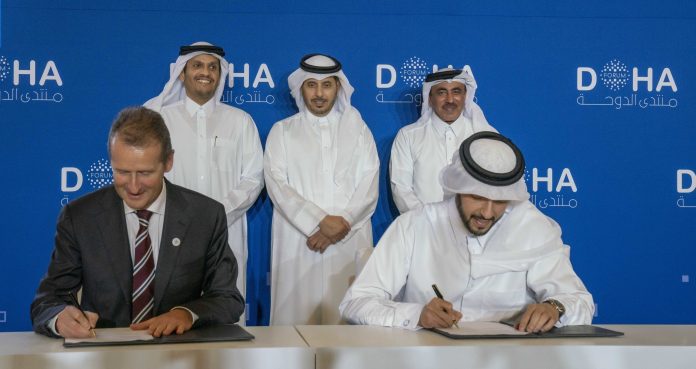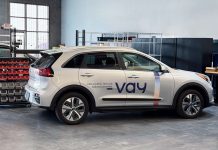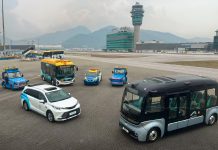For the first time ever a cutting-edge fleet of self-driving Level 4 electric shuttles will usher in a new era of urban mobility in a capital city in 2022: Earlier today in Doha, representatives of Volkswagen AG and the Qatar Investment Authority (QIA) signed the ‘Project Qatar Mobility’. The goal is to develop a ground-breaking autonomous transport project and transform the future of urban mobility to a sustainable and commercial deployment of AD shuttles and bus services – even beyond 2022. Fostering a cross-brand collaboration as blueprint for future Autonomous Driving (AD) solutions, Volkswagen Commercial Vehicles, Scania, MOIA and AID-Autonomous Intelligent Driving will play an important role in this project. During the largest sporting event in the world, Qatar will thus be the venue for the world’s first emission-free, electric and autonomous public transport system.
The agreement was signed by QIA CEO Mr Mansoor Al-Mahmoud and Herbert Diess, CEO of Volkswagen Group, at a ceremony in Doha. The initiative, which is known as “Project Qatar Mobility”, underlines the mutual commitment to both smart technologies and green transport:
QIA and Volkswagen will work together to develop the required physical and digital infrastructure to seamlessly integrate a fleet of self-driving vehicles into Doha’s existing public transport network. 35 autonomous, electric ID. BUZZ AD from Volkswagen Commercial Vehicles will shuttle up to four passengers in Westbay area on semi-fixed routes, while ten high-tech Scania buses pick up larger groups. Volkswagen Group’s units AID and MOIA will provide the SDS knowledge and the app software to run the service. For the first time four Volkswagen Group brands work together on such a project of urban mobility.
The landmark project will create a holistic ecosystem for autonomous driving, including the creation of an appropriate legal framework, smart city infrastructure and transfer of knowledge, which can be used as a blueprint to transform urban mobility, both in Qatar and beyond. Closed testing of the shuttle vehicles and buses is expected to begin in 2020 and trials will start as early as 2021. The project will go live by the end of 2022, providing a technical showcase of future autonomous driving.













